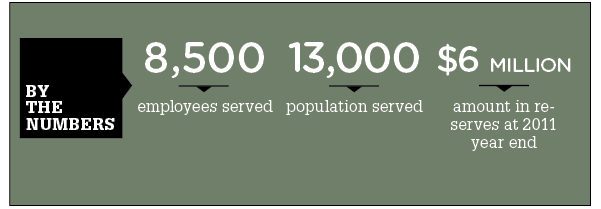A little more than a decade ago, eight Florida-based private colleges and universities got together and decided that, when it came to the price of the health-care insurance benefits they were providing staff, they could do better. They realized that, if they pooled their resources, as a larger community, they would be able get more competitive rates and offerings. Later that year, they formed ICUBA [the Independent Colleges and Universities Benefits Association] a nonprofit Internal Revenue Code Section 501(c)(9) voluntary employees’ beneficiary association headquartered in Orlando, Florida.
The health-care cooperative is comprised of private-education employers that pool together their resources to self-fund health-insurance benefits for their employees. Today, the association has 21 members—11 higher-education institutions, including Nova Southeastern University, The University of Tampa, and Rollins College; seven K-12 schools, which ICUBA began opening its doors to in 2006; two area health-education centers; and The Poynter Institute, a nonprofit school for journalism, which owns the Tampa Bay Times. More than half of the employer members have less than 100 employees. “We’re run like a mutual insurance company,” explains Mark Weinstein, president and CEO, who came on board in 2003. “We have 14 board members—all appointed by presidents or headmasters of member employers—who are responsible for approving the annual budget, including determination of the next year’s health-insurance premiums, which are split between the institution and the employee.”
In the beginning, ICUBA stuck to the basics, offering medical, behavioral health, and prescription-drug insurance benefits on a self-funded basis. Blue Cross Blue Shield of Florida (BC/BS) administers the medical program, MHNet the behavioral health/substance abuse and Employee Assistance Program benefits, and Catalyst Rx handles the prescription-drug benefits. They aren’t optional—all members must offer the entire program.
ICUBA offers a choice of two BC/BS medical plans—a copay model and a coinsurance model. “The latter plan allows a person to negotiate or be more aware of what the true cost of services are. In many instances, the out-of-pocket cost to the insured member could be less than a copay, so we’re seeing a greater migration to that consumer-directed health plan,” Weinstein says. “Then in 2005, we said, let’s take advantage of our purchasing power, and we added fully insured dental, vision, life, and disability benefits.” For these products, ICUBA offers an endorsed product that members can choose to participate in or not.
The advantages of the cooperative were immediate in the first year—reduced premium taxes, administrative fees, broker commissions, and other insurance fees for participating members. In addition, members began receiving better insurance benefits because they were part of a larger group. But, Weinstein recalls, figuring out the right product/pricing mix has been an interesting learning experience, some would say from the school of hard knocks.
The first year, “We had a $5.6 million loss, and I had to go out and raise $10 million capital from the employer members, who had all signed up for five years and really didn’t have a choice but to help recover the organization,” Weinstein says. ICUBA has since lowered the membership agreement from five to three years and restructured the pricing. “It was poorly set up by the consultants and actuaries that initiated the program and they didn’t price the plan accordingly,” he says. To turn that around, ICUBA reworked the plan design, increasing deductibles, and out-of-pocket responsibilities, “but we were very strategic about it,” he says.
At the same time, ICUBA set up health-reimbursement accounts (HRAs) to allow employees to pay for medical expenses with before tax dollars, and asked the member organizations to contribute to fund them, thereby making employees owners in the ICUBA program rather than merely annual insurance policyholders. ICUBA also allows its HRA to roll over to a new year and accumulate, something practically unheard of in the corporate world.
Over the next two to three years, one of ICUBA’s chief goals is to grow the number of participating employees beyond 10,000 (they’re at 8,500 now) to capitalize on better economies of scale and risk-diversification strategies. They’ll continue utilizing their insurance partner relationships to foster improved population health, keeping annual insurance premium increases to low single digits, and to deliver targeted communications and incentives to insured members. ICUBA will also continue to build on the spirit of collaboration with each of its member schools to develop new business by exceeding the expectations of current members.


